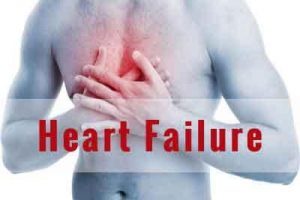- Home
- Editorial
- News
- Practice Guidelines
- Anesthesiology Guidelines
- Cancer Guidelines
- Cardiac Sciences Guidelines
- Critical Care Guidelines
- Dentistry Guidelines
- Dermatology Guidelines
- Diabetes and Endo Guidelines
- Diagnostics Guidelines
- ENT Guidelines
- Featured Practice Guidelines
- Gastroenterology Guidelines
- Geriatrics Guidelines
- Medicine Guidelines
- Nephrology Guidelines
- Neurosciences Guidelines
- Obs and Gynae Guidelines
- Ophthalmology Guidelines
- Orthopaedics Guidelines
- Paediatrics Guidelines
- Psychiatry Guidelines
- Pulmonology Guidelines
- Radiology Guidelines
- Surgery Guidelines
- Urology Guidelines
Antidepressant does not reduce hospitalization, death for HF patients with depression

In a study appearing in the issue of JAMA, Christiane E. Angermann, M.D., of University Hospital Wurzburg, Germany, and colleagues examined whether 24 months of treatment with the antidepressant escitalopram would improve mortality, illness, and mood in patients with chronic heart failure and depression.
Previous meta-analysis indicates that depression prevalence in patients with heart failure is 10 percent to 40 percent, depending on disease severity. Depression has been shown to be an independent predictor of mortality and re-hospitalization in patients with heart failure, with incidence rates increasing in parallel with depression severity. Long-term efficacy and safety of selective serotonin reuptake inhibitors (SSRIs), which are widely used to treat depression, is unknown for patients with heart failure and depression.
For this study, 372 patients with chronic heart failure with reduced ejection fraction (a measure of heart function) and depression were randomly assigned to receive escitalopram or matching placebo in addition to optimal heart failure therapy. During a median participation time of 18.4 months (n = 185) for the escitalopram group and 18.7 months (n = 187) for the placebo group, the primary outcome of death or hospitalization occurred in 116 (63 percent) patients and 119 (64 percent) patients, respectively. There was no significant improvement on a measure of depression for patients in the escitalopram group.
"These findings do not support the use of escitalopram in patients with chronic systolic heart failure and depression," the authors write.

Disclaimer: This site is primarily intended for healthcare professionals. Any content/information on this website does not replace the advice of medical and/or health professionals and should not be construed as medical/diagnostic advice/endorsement or prescription. Use of this site is subject to our terms of use, privacy policy, advertisement policy. © 2020 Minerva Medical Treatment Pvt Ltd